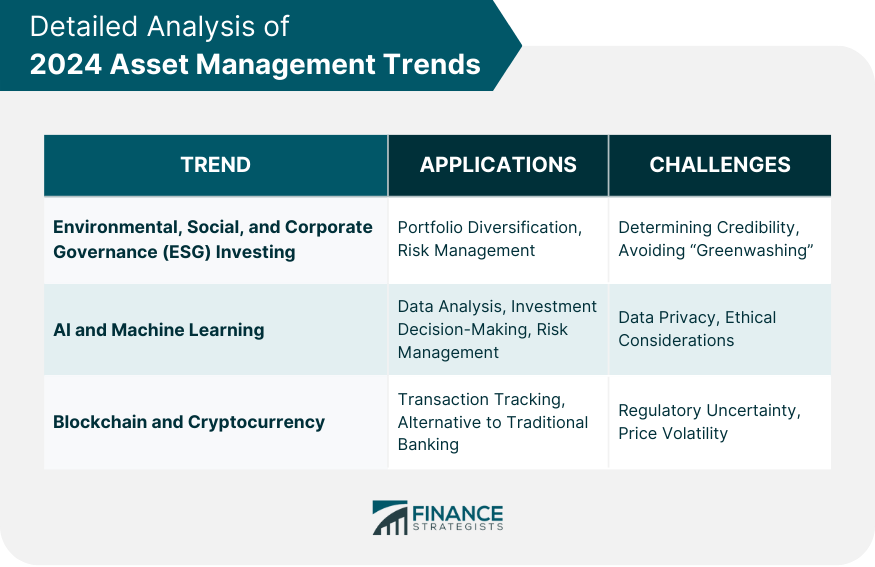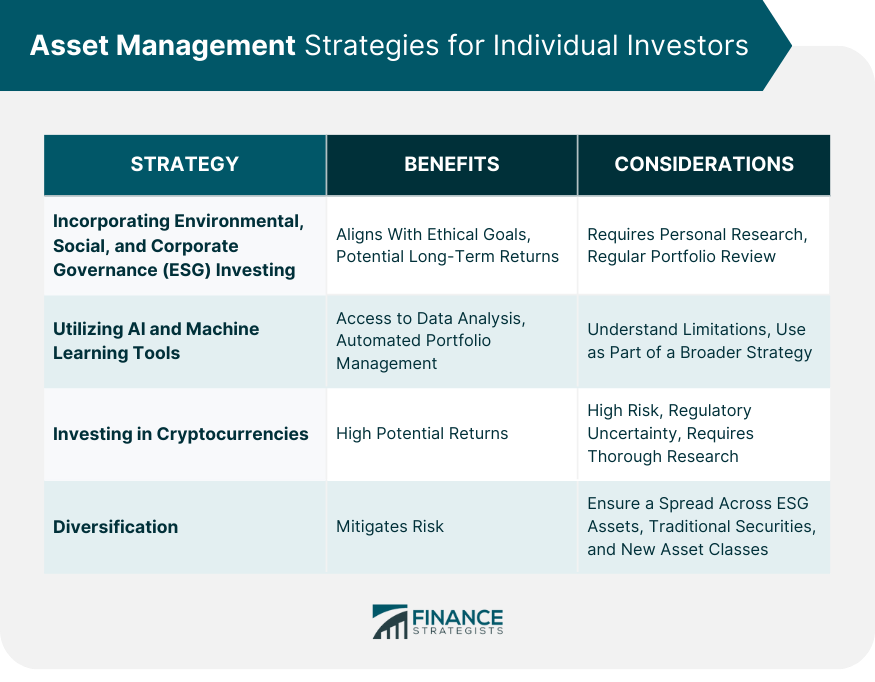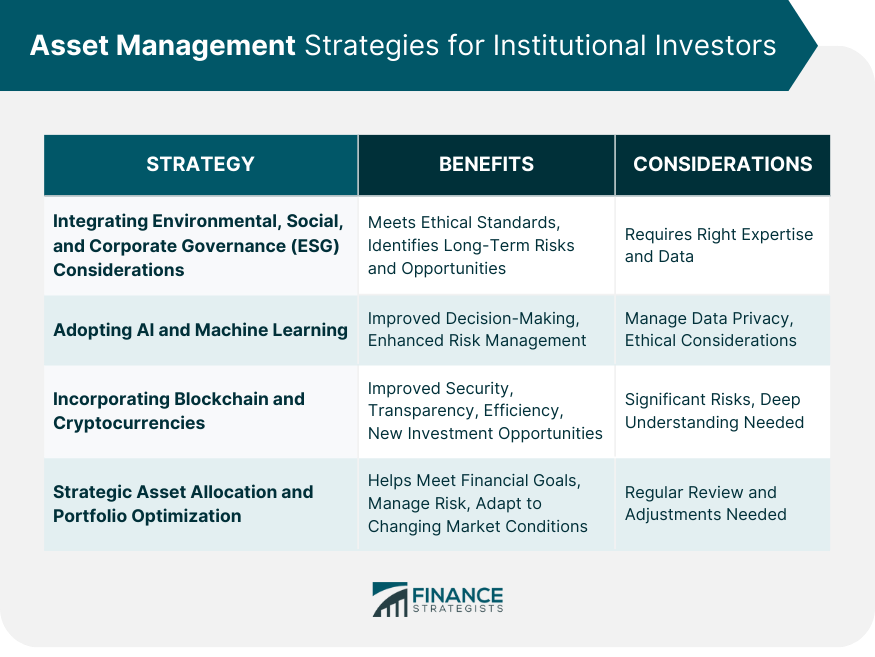Asset management involves making investment decisions to increase the value of a client's portfolio. This process can involve choosing the right investment opportunities, regularly reviewing the performance of these assets, and making necessary changes to meet the investor's goals. Asset managers utilize their in-depth market knowledge, financial expertise, and understanding of the client's needs to make informed decisions. They actively manage portfolios, making strategic buy and sell decisions to maximize returns and minimize potential losses. Effective asset management is central to both wealth creation and preservation. By diversifying investments and managing risk effectively, asset managers can generate returns and protect wealth against market volatility. Moreover, they can ensure that investments align with changing client needs, market conditions, and long-term financial objectives. Hence, a proficient asset management strategy can help avert potential financial setbacks while creating opportunities for significant growth. While the benefits of ESG investing are clear, there are also challenges. These include defining what constitutes an ESG investment and measuring the impact of these investments. The subjective nature of ESG factors and lack of standardized reporting can create challenges in evaluating investments. Nevertheless, the potential benefits, such as improved reputation, risk mitigation, and higher returns, often outweigh these challenges, indicating that ESG investing is not only ethically right but also financially rewarding. AI and ML are used in various ways in asset management, including data analysis, risk management, and automated trading. As these technologies continue to evolve, it is expected that even more applications, such as personalized investment advice and more sophisticated risk modeling. The predictive capabilities of AI and ML could lead to more accurate forecasts, improving the selection and timing of investment decisions, thus potentially boosting the returns of investment portfolios. AI and ML have proven to be highly effective in asset management, providing insights that can lead to better investment decisions. These technologies can analyze data more accurately and quickly than humans, reducing errors and improving efficiency. They can extract patterns and correlations from vast data sets, offering a level of insight that would be impossible for a human analyst. As a result, they're instrumental in generating alpha and managing risk in investment portfolios. Blockchain technology is transforming asset management by providing a secure, transparent way to track transactions. This technology can reduce fraud and errors, streamline operations, and improve transparency, benefiting both asset managers and investors. Blockchain's decentralized and immutable nature offers increased security, and its use in asset management is creating more efficient, transparent, and reliable systems. Cryptocurrencies offer new investment opportunities, but they also come with risks, including price volatility and regulatory uncertainty. Despite these challenges, some asset managers are incorporating cryptocurrencies into their strategies, attracted by the potential for high returns. However, the highly speculative nature of cryptocurrencies means they should be approached with caution, and investors must be prepared for the possibility of sudden and significant price fluctuations. The trends identified in 2024 are shaping investment strategies in significant ways. ESG considerations are becoming integral to investment decisions, AI and ML are driving data analysis and risk management, and blockchain and cryptocurrencies are providing new investment opportunities and ways to track transactions. These trends are creating a more sophisticated investment landscape where data-driven insights, ethical considerations, and technology-driven efficiencies are paramount. As these trends gain momentum, they're likely to affect the regulatory landscape. Regulators are already scrutinizing ESG claims more closely to prevent "greenwashing," while AI, blockchain, and cryptocurrencies present new regulatory challenges due to their transformative nature. Regulations need to evolve to ensure these technologies are used responsibly and do not contribute to financial instability or unfair practices. Risk management is also being transformed by these trends. ESG factors can help identify long-term risks associated with climate change and social issues, AI and ML can provide more sophisticated risk modeling, and blockchain can provide a more secure and transparent way to track transactions. However, these trends also introduce new risks, such as the ethical and privacy concerns associated with AI and the volatility of cryptocurrencies. Individual investors looking to incorporate ESG investing into their portfolios should start by defining their ethical and financial goals. It's essential to conduct due diligence on potential investments to ensure they align with these goals. Using ESG ratings and reports can be a helpful starting point, but these should be supplemented with personal research. As with any investment, diversification is vital, and it's essential to regularly review and adjust the portfolio as necessary. AI and ML tools can be beneficial for individual investors, providing access to data analysis and insights previously only available to institutional investors. These tools can help individuals make more informed investment decisions and automate certain aspects of portfolio management. However, while these technologies can provide valuable insights, it's essential to understand their limitations and use them as one part of a broader investment strategy. Investing in cryptocurrencies can offer high returns, but it also comes with significant risks. Price volatility, regulatory uncertainties, and the risk of hacking are major concerns. Therefore, it's essential to conduct thorough research, understand the technology behind cryptocurrencies, and only invest money that you can afford to lose. It's also advisable to diversify your investments and consider the role of cryptocurrencies within your overall portfolio. Diversification is a crucial tool for managing investment risks. By spreading investments across different asset classes, geographic regions, and industries, investors can mitigate the risk of a single investment negatively impacting their overall portfolio. In the context of the trends identified in 2024, diversification might mean spreading investments across ESG assets, traditional securities, and new asset classes like cryptocurrencies. Institutional investors can integrate ESG considerations into their investment policies by explicitly including ESG factors in their investment analysis and decision-making processes. This could involve using ESG scores as part of their asset valuation models, engaging with companies on their ESG performance, or excluding certain sectors or companies based on ESG criteria. Institutions also need to ensure they have the right expertise and data to assess ESG risks and opportunities effectively. AI and ML can offer institutional investors significant benefits, including improved decision-making and risk management. By analyzing vast amounts of data quickly and accurately, these technologies can provide insights that might otherwise be missed. However, the adoption of AI and ML also requires a careful approach to managing issues such as data privacy and ethical considerations. Institutions also need to understand the underlying models and assumptions used by these technologies to ensure they're appropriate for their needs. Institutional investors are increasingly exploring the potential of blockchain and cryptocurrencies. Blockchain can offer improved security, transparency, and efficiency, while cryptocurrencies offer a new asset class with high potential returns. However, these technologies also present significant risks and require a deep understanding to be incorporated effectively. Institutions need to monitor regulatory developments closely and ensure they have robust risk management processes in place. Strategic asset allocation and portfolio optimization are essential for institutional investors. These strategies can help institutions meet their financial goals, manage risk, and adapt to changing market conditions. In a rapidly evolving investment landscape, institutions need to regularly review and adjust their strategic asset allocation to ensure it remains aligned with their goals and risk tolerance. At the same time, portfolio optimization techniques, such as diversification and rebalancing, can help enhance returns and manage risk. The landscape of asset management is continuously evolving, with trends like ESG investing, AI and Machine Learning, and Blockchain and Cryptocurrency steering significant changes in 2024. The influence of these trends reaches far, reshaping investment strategies, regulatory landscapes, and risk management practices while offering numerous benefits and novel challenges to both individual and institutional investors. ESG investing promotes ethical consideration, AI and ML technologies increase efficiency and insight, and blockchain and cryptocurrencies propose exciting new avenues of investment. However, the effectiveness of these tools relies on informed utilization, stringent ethical and regulatory considerations, and strategic diversification of assets. Reach out to your trusted wealth management advisor today to better understand and benefit from these emerging trends in asset management.Understanding Asset Management
Detailed Analysis of 2024 Asset Management Trends
Exploration of Environmental, Social, and Corporate Governance (ESG) Investing
Challenges and Benefits of ESG Investing
In-Depth Look at AI and Machine Learning in Asset Management
Current Applications and Potential Future Uses
Effectiveness of AI and Machine Learning in Asset Management
Examination of Blockchain and Cryptocurrency in Asset Management
How Blockchain is Revolutionizing the Sector
Role and Potential Risks of Cryptocurrency in Asset Management

Implications of 2024 Asset Management Trends
Influence on Investment Strategies
Potential Impact on Regulatory Landscape
Effect on Risk Management in Asset Management
Asset Management Strategies for Individual Investors
Incorporating ESG Investing
Utilizing AI and Machine Learning Tools
Investing in Cryptocurrencies
Diversification

Asset Management Strategies for Institutional Investors
Integration of ESG Considerations
Adoption of AI and Machine Learning
Incorporating Blockchain and Cryptocurrencies
Strategic Asset Allocation and Portfolio Optimization

Bottom Line
Asset Management Trends FAQs
The main trends in 2024 include a shift towards ESG (Environmental, Social, and Governance) investing, increased use of artificial intelligence (AI) and machine learning (ML) in decision-making and risk management, and wider adoption of blockchain and cryptocurrency.
ESG investing is gaining traction due to growing awareness of climate change and social justice issues. Investors are increasingly seeking out companies that adhere to sustainable practices and good governance.
AI and ML are revolutionizing asset management by providing new ways to analyze data, make investment decisions, and manage risk. They enhance efficiency, reduce human error, and increase the speed and accuracy of analysis.
Blockchain offers a secure and transparent way to track transactions, while cryptocurrencies present new investment opportunities. These technologies are democratizing finance, offering alternatives to traditional banking structures.
Strategies include integrating ESG considerations into investment policies, utilizing AI and ML tools for decision-making and risk management, incorporating blockchain and cryptocurrencies wisely, and maintaining diversified portfolios.
True Tamplin is a published author, public speaker, CEO of UpDigital, and founder of Finance Strategists.
True is a Certified Educator in Personal Finance (CEPF®), author of The Handy Financial Ratios Guide, a member of the Society for Advancing Business Editing and Writing, contributes to his financial education site, Finance Strategists, and has spoken to various financial communities such as the CFA Institute, as well as university students like his Alma mater, Biola University, where he received a bachelor of science in business and data analytics.
To learn more about True, visit his personal website or view his author profiles on Amazon, Nasdaq and Forbes.















